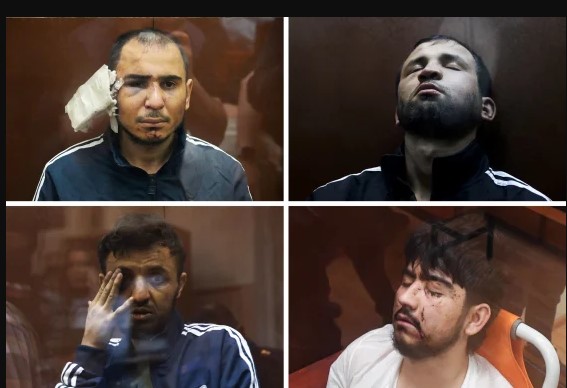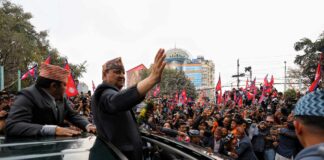By P.K.Balachandran
Colombo, March 26: The terror attack on a packed concert hall in Moscow last Saturday that claimed more than 130 lives has thrown up many questions.
Though the attackers were Tajik nationals affiliated to the Islamic State (ISIS-K), the Russians refuse to believe that it was just another act of Islamic terrorism.
President Vladimir Putin suspects that the gunmen were sent by Ukraine because they had tried to get into Ukraine after committing the horrific crime. Putin further suspects that the operation was masterminded by the US.
There is another dimension to the attack which needs to be looked at and that is the alienation of Russian Muslims from the Russian State. Ukraine and the US may have jointly exploited the Russian Muslims’ alienation from the Moscow regime.
Since the 1990s, there have been rebellions in the Muslim majority republics of the Russian Federation. Though Tajikistan has been independent since 1991, the ISIS-K based in Tajikistan and other Muslim majority republics could have been motivated to carry out the strike.
Putin’s Theory
Putin said on Monday that the Crocus City Hall attack was a clear attempt to intimidate Russia and that it serves the interests of the Ukraine and the external powers behind it.
“This atrocity may be only a link in a whole series of attempts by those who have been fighting our country since 2014, using the neo-Nazi Kiev regime as their hand,” Putin said. “And the Nazis, as is well known, never hesitated to use the most dirty and inhumane means to achieve their goals.”
A terrorist group calling itself Islamic State Khorasan (ISIS-K) has claimed responsibility for the concert venue massacre. The US and the EU swiftly insisted that Ukraine had nothing to do with the attack and that ISIS-K, a shadowy group allegedly operating in Afghanistan and Central Asia, was the sole culprit.
Russian security services have apprehended a dozen suspects, including seven alleged perpetrators, intercepted as they drove towards the border with Ukraine. They were identified as Tajik nationals. Speaking on Monday evening, Putin described them as “radical Islamists.”
A question that needs answering is why the terrorists headed for Ukraine after carrying out the attack, Putin said.
“Who was waiting for them there? It is clear that those who support the Kiev regime do not want to be accomplices and sponsors of terrorism. But a lot of questions remain,” he added.
While Russia knows who pulled the trigger, the president said, Moscow still needs to find who gave the order. He made it clear that Kiev is his primary suspect.
Alienation of Muslims
Ukraine could have used the ISIS-K exploiting the alienation of Russian Muslims from the Russian State. There is anti-Russian feeling in the Northern Caucuses comprising Dagestan, Chechnya and Karachaevo-Cherkessia. After the Soviet Union broke up in the early 1990s, trouble arose in the Muslim majority areas of North Caucuses as they wanted independence.
In 1995-1996, the Chechens took hundreds of hostages in a hospital in Dagestan. In October 2002, Chechen militants took about 800 people hostage at a Moscow theatre. Two days later, Russian special forces stormed the building and 129 hostages and 41 Chechen fighters were killed.
In September 2004, about 30 Chechen militants seized a school in Beslan in southern Russia taking hundreds of hostages. The siege ended in a bloodbath two days later and more than 330 people, about half of them children, were killed.
In 2010 Russia alleged that Dagestani rebel Magomed Vagabov was behind the suicide attack in the Moscow Metro and killed him.
Between 2007 and 2017, Islamist insurgency in North Caucasus led to clashes with Russian forces. In October 2015, a bomb planted by ISIS downed a Russian passenger plane over Sinai, killing all 224 people on board, most of them Russian vacation-goers returning from Egypt.
In 2022, clashes erupted in Dagestan against Russia’s attempt to recruit locals for its war in Ukraine. The protesters expressed anger over the death of a large number of Dagestani soldiers in the Ukraine war.
In Chechnya, resistance to Russian rule dates back at least two centuries. Rebels there began agitating for independence after the Soviet Union collapsed in 1991. Russia unleashed a major invasion marked by relentless airstrikes and salvos of heavy artillery. Thousands of fighters and tens of thousands of Chechen civilians were killed. The Chechen capital, Grozny, was laid waste.
Having failed to crush the rebellion, President Boris Yeltsin, in 1996, signed a peace treaty with Chechnya, removed all Russian troops from the territory and granted broad autonomy, though not formal independence.
But three years later, Yeltsin’s new Prime Minister, Vladimir Putin, began the campaign to bring Chechnya firmly under Russian control.
Putin resumed the bombing of Chechen rebels. The second Chechen war was also brutal, though this time the Russians were on top. Russian forces took control of the breakaway republic after just a few months.
Putin installed a Kremlin-friendly leader, Akhmad Kadyrov, to strengthen his hold on the territory. When Kadyrov was assassinated in 2004, his son, Ramzan Kadyrov took over.
Draconian Curbs on Muslims
Writing in the journal Dirasat in 2018 on “Managing Muslim Minorities in Russia”, historian Prof Elmira Akhmetova, of the International Islamic University of Malaysia, says that the Global War on Terror following 9/11, badly affected the security of Russia’s Muslims.
The Russian government became suspicious about Russian Muslims’ relations with the Muslim world, particularly with the oil-rich countries of the Gulf and Saudi Arabia. Donations coming from Saudi Arabia were blocked, and Saudi-funded institutions were banned to stem “Wahhabism”.
Religious pamphlets and books (mostly translations into Russian) published in Saudi Arabia were ruled as “extremist” and “dangerous for national security.”
Russia’s Muslims were socially marginalized. Extensive media attention on the transgressions carried out by the ISIS had a major impact on the traditional image of Muslims in Russia as a law abiding people. The presence of Russia’s Muslims, mainly from the regions of Chechnya and the North Caucasus, in the ranks of ISIS further aggravated the fears.
In September 2013, Sergey Smirnov, Deputy Director of the Federal Security Service of the Russian Federation (FSB), declared the presence in Syria and Iraq of around 300–400 militants of Russian origin.
Consequently, cases of arrests of Muslims on allegations of being involved in terrorist activities significantly increased. Nongovernmental organizations (NGOs) faced more harassment and reprisals under the “foreign agents” law, while their access to foreign funding was further restricted by a new law banning “undesirable” organizations.
Consequently, local Muslims, who expressed their sympathy towards the Crimean Tatars’ strong anti-Russian position or criticized Russian policies toward Ukraine, were arrested.
Prof. Elmira Akhmetova suggests in her paper that since the main damage to the religious freedom of Russian citizens emanates from the 2002 “Extremist Law” its articles should be reconsidered.
“The authorities should recognize that Russia’s Muslims are living in their native lands, that they are free to move from one region to another, and that their presence in the country is not temporary.”
Therefore: “Authorities in the regions inhabited by Muslims have to accept and practice ethnic and religious equality as promoted by the constitution.”
The Russian constitution is secular and non-discriminatory and that should not be lost sight of, Prof, Akhmetova says.
Tolerance and respect toward Muslims and other citizens of the country must be instilled in the general population, she demands as most Russian Muslims see themselves as belonging to Russia. Their isolation and ghettoization will only hamper Russia’s economic growth and political stability she warns.
END



 Logging you in...
Logging you in... Loading IntenseDebate Comments...
Loading IntenseDebate Comments...

